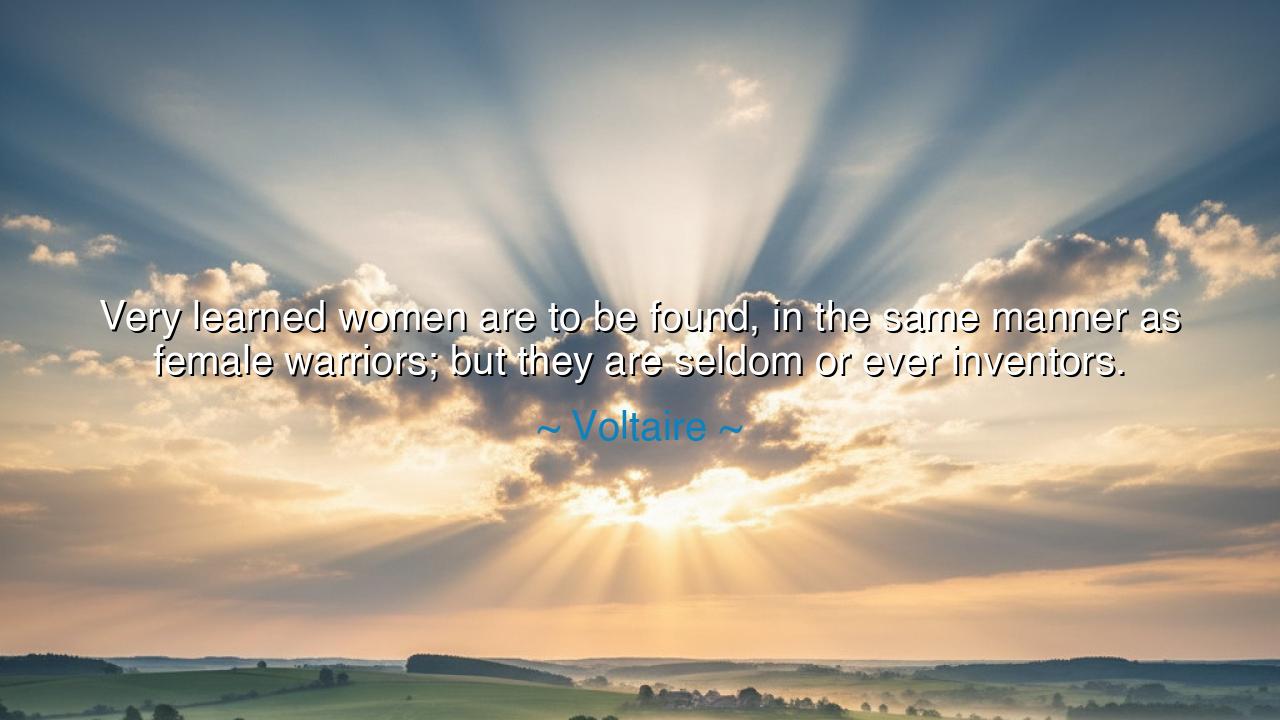
Very learned women are to be found, in the same manner as female
Very learned women are to be found, in the same manner as female warriors; but they are seldom or ever inventors.






The words of Voltaire, “Very learned women are to be found, in the same manner as female warriors; but they are seldom or ever inventors,” flow with both admiration and limitation. In this sharp saying, he acknowledges that women of great knowledge and even martial valor exist, yet he confines their recognition by suggesting rarity in the realm of invention. Beneath his words lies the imprint of his age—an Enlightenment world where women were often denied the tools of invention, yet judged for not producing it.
For centuries, women were shut out from universities, guilds, and academies, the very places where learning and invention were cultivated. Their intellects were not lacking, but their opportunities were bound. When Voltaire compared them to female warriors, he invoked images of Amazons—extraordinary, admired, but seen as exceptions, not as equals. In this, he both flatters and diminishes, offering praise that still confines women to the margins of history.
Yet history itself defies his conclusion. Consider Hypatia of Alexandria, a philosopher and mathematician of late antiquity, who taught astronomy and invented instruments for measurement. Or Ada Lovelace, centuries after Voltaire, who envisioned the first algorithm and is now hailed as the mother of computer science. These women prove that invention was not absent from their sex, but suppressed by the chains of culture. Their genius was real, and where it appeared, it shone with blinding brilliance.
Voltaire’s words also reveal the paradox of his own time. He lived in an age that adored the wit of Madame de Staël and the intellect of Émilie du Châtelet, his own lover and collaborator, who translated Newton’s Principia into French and illuminated its meaning for Europe. Without her, the discoveries of Newton might have remained inaccessible to much of the continent. If invention was rare among women, it was not for lack of ability, but because the gates of invention were guarded by men.
So let the generations remember: when you hear that women are not inventors, ask who kept the tools from their hands, the books from their eyes, the workshops from their reach. The rarity of female warriors and inventors is not proof of nature, but of history’s injustice. For whenever women have been given space to learn, they have shown that their genius rivals and equals that of men. The lesson is not that invention belongs to one sex, but that invention blossoms where freedom allows it.






KTNguyen Thi Kim Thu
Voltaire’s quote comes off as quite dismissive, as it implies that women, even if educated, don’t possess the same ability for innovation as men. Given the rise of prominent female inventors in recent times, how much of this perception was shaped by social norms and not by actual capacity? How much longer will we allow historical biases like this to influence how we view women’s contributions to society?
HNHa NGoc
I can’t help but feel that Voltaire’s quote is a reflection of his time, and that it no longer holds any real truth. Women today are inventors, creators, and innovators in every field. Does this quote suggest that women’s intellectual potential is somehow different, or does it simply point to historical social constraints that made it harder for women to be recognized in creative and scientific fields? The concept of female inventors is still developing in some ways.
DHduong hong
Voltaire’s statement seems to reinforce the idea that women, no matter how educated or accomplished, have been historically seen as incapable of inventing or creating something entirely new. This makes me wonder if there’s a deeper societal issue here that prevents women from being acknowledged for their contributions. If women are just as capable as men in other fields, why have their inventions often been overlooked or undercredited?
111gggyy
This quote feels reflective of Voltaire's time, where societal roles for women were rigidly defined. However, if we look at the history of female inventors like Marie Curie, Ada Lovelace, or Hedy Lamarr, it becomes clear that the capacity for innovation is not limited by gender. Could it be that Voltaire was simply echoing the prevalent views of his era, which restricted women's access to opportunities for invention and creativity?
ANLe Anh Ngoc
Voltaire's quote seems to perpetuate outdated stereotypes, suggesting that while women can be learned or capable, they aren't innovators or inventors. I find this troubling, as it overlooks the many women throughout history who have been pioneers in science, technology, and the arts. Why do we still cling to the idea that women are suited for certain roles but not for creative or groundbreaking work? Isn’t innovation a human trait, not bound by gender?